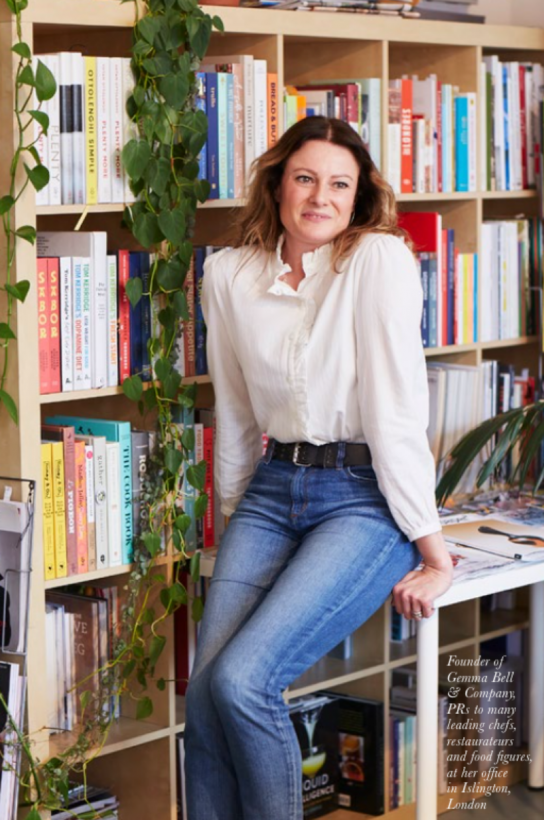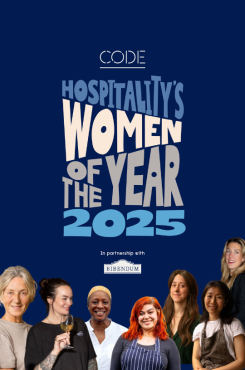Stacks of inspiration
Published 4 August 2020
by Lisa Markwell

You’d expect people in the food business to have lots of books, but with so many new titles every year, how do the experts choose what to keep and cook from? Four women with voracious reading habits share what’s on their shelves with Lisa Markwell.
Thomasina Miers
It feels sometimes like the house is being pulled into the earth by the weight of my cookbook collection! Because I write recipes for a living, there is always something to learn, but I only buy the books of the people I want to read, so I already know there’s a quality standard, both in the food writing and the visuals too.
Moro was pretty much the first cookbook I remember, it was so inspiring. I already had a love for Spain but it felt that before Moro, no one had really paid any attention to Spanish food. It was such a breath of fresh air. I search out old books like Richard Olney, Paul Richardson and talk about them with my chef friends. Then there’s Jane Grigson and Elizabeth David, which John Torode told me on MasterChef when I was a contestant. And Delia is right up there, by the way.
It’s quite rare for me to get my head turned by a new book –but I got Salt Fat Acid Heat for my birthday and like A Wong, when you’ve got an expert in their field, their book is quite irresistible. Then sometimes a food writer just breaks out and it’s so inspiring, like Anna Jones – she did something no one had done before. I’m in the process of moving house and I’ve had to get rid of three boxes of books – it was almost impossible, because every time I opened a cookbook I’d start leafing through it. Now that I’ve got three children, gone are the days when I could spend an afternoon with a book. So I spent a Saturday trying to be efficient but all I did was look through an old Thomas Keller and then realised he’s got the best technique for the perfect carrot… so that stayed!
Felicity Cloake
When I moved into this flat four years ago, I brought about 15 of those big packing boxes with me, filled with books and my collection has just kept growing. It takes up the entire hall. People just keep publishing food books! My problem is, I think ‘Oh, that could be useful one day’, so I never get rid of anything. For instance Coca Cola will send me a cookbook and I think ‘Ugh, I don’t even like Coca Cola… but then if I’m doing a ham in coke recipe I’ll need it. You just never know. But then again, I’m not a reference library so perhaps I should just leave it!
You might not be able to tell, but there is a system. It’s divided by baking, country, meat, fish, and so on.
I’m doing this book on French food, but before that, the France section was quite a lot smaller than the Italian one – but it is huge. I’ve had to go into the bedroom … that subsection is now massive!
On the top shelf are the books about food, rather than recipe books; things like MFK Fisher, The Diet Myth, Jay Rayner’s books, Bee Wilson… Then I’ve got my reference section behind me – I was delighted to find I had three guides to cheese.
I’ve never asked an author to sign a book, I’m too embarrassed to do that. Well, I did do an event with Yotam Ottolenghi and that time I did ask him to sign, but that’s the only time, although I love it when people do it to me!
Camilla Schneideman
We have so many books in the library here but we have to – it means that if the students have a particular ingredient or dish in mind, whether that’s charcuterie or whatever, they can look through a variety of books within one category. The trainee chefs on the diploma course get set projects like ‘lunch for 50’ and they can research widely – from Japanese to vegan, anything really. And the teachers have a big part on choosing which books get onto the shelves.
But if I’ve got people coming round for dinner, I’ll come in and have a quick look for inspiration too!
It must be very depressing for a cookbook author that people might only ever cook one of their recipes… but that’s what happens with lots of books. If I get a new cookbook and I’m excited by it, I’m quite pathetic, I carry it around with me. I asked for the Ottolenghi Simple book for Christmas and read it all. In January, when I was trying to do meat-free I was literally carrying around Anna Jones to dip in and out. I think when people say ‘Oh it’s all gone online’ they’re missing the point. People love books.
The other day I found the first cookbook that I ever wrote, which was when I was at university living with a friend who was a rubbish cook – always has been, always will be – and she said ‘Can I just have the recipes for things that we’ve eaten’. And I looked at it recently and it was all that stuff that I think, ‘that’s still a good recipe!’
Gemma Bell
I’ve got about 20 cookbooks at home but when we moved house, there wasn’t enough space for more, so I brought most of my collection to work, thinking they could be useful here. So it’s a collection of my own books, ones by clients and then some I get sent.
I always read the introduction and then turn to the back to see if we get a mention! But seriously, it’s good to have the books at work because a good book is inspiring – I encourage people to take one home and read it, cook from it. And it helps the team articulate what a certain chef or restaurant is all about. Nopi was one of my first clients when I started and when the book came out it felt personal to me. I love books where you can see the client’s journey – it’s exciting to be able to say ‘Oh, I remember that.’
It’s a bit grubby now, but The Mirabelle Cookbook is really special. When I was much younger I worked at the Mirabelle running the PDRs – it was such a fun time. Ben, my husband, bought this for me – and now the building’s been knocked down so it’s a bit of history. Mind you, the pictures looks very dated!
It impossible to choose a favourite, but I love Ferran Adria’s The Family Meal. It’s genius; there’s a crisp omelette in here! It takes you through all the steps – it’s the kind of book Ben and I would take on holiday with loads of family, all the recipes scale up. And it’s a wonderful insight into a restaurant, it’s how they cook for each other.
To read more articles from the latest edition of the CODE Quarterly magazine, click here




